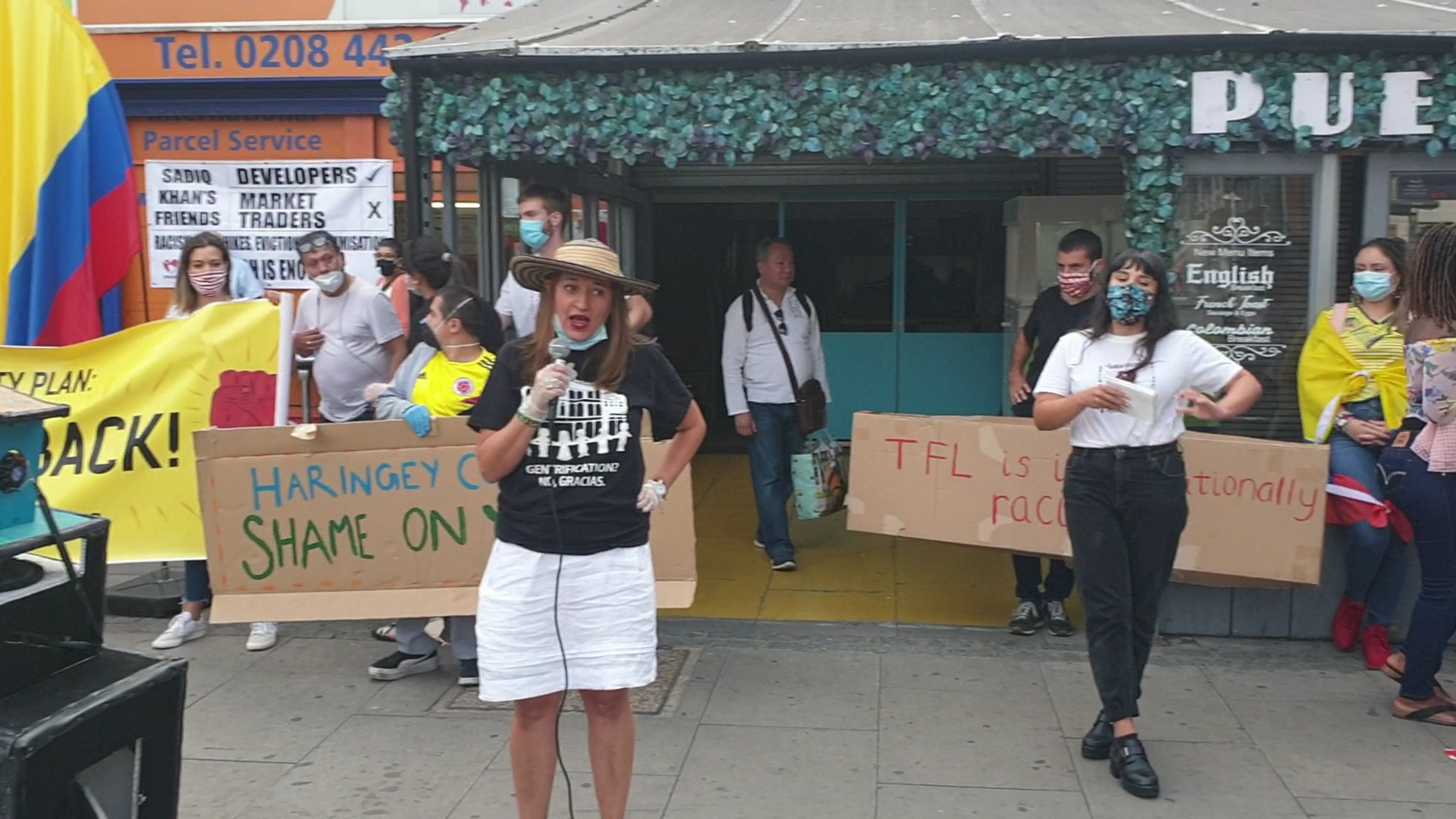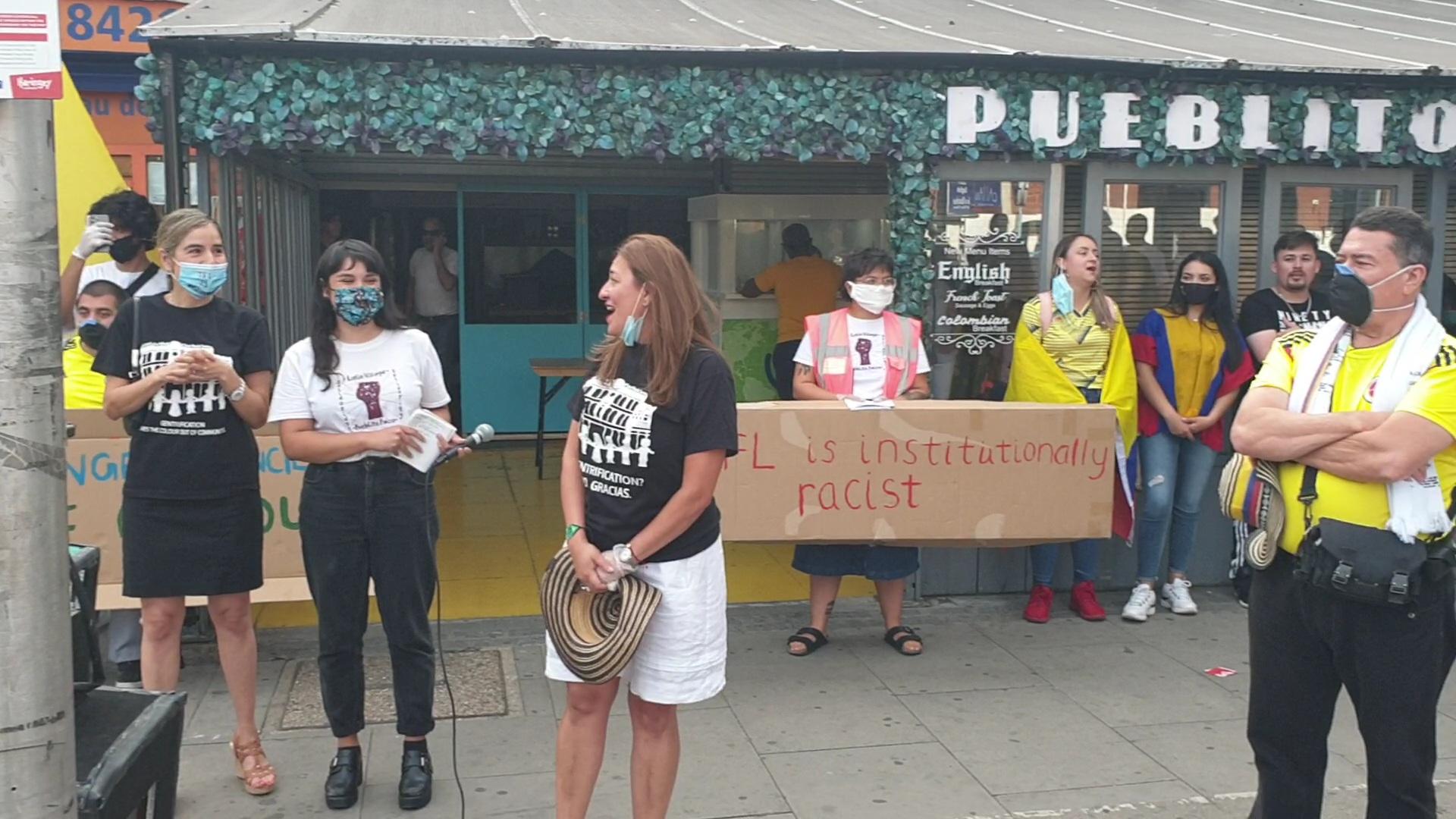

Protesters outside the “Latin Village” market. (Photo by Bala Chambers/Latino Rebels)
LONDON — Twenty years ago, Vicky Álvarez Martínez was granted asylum in the U.K. after her father was murdered during the conflict between the rebel group the Revolutionary Armed Forces of Colombia (FARC) and the government in Colombia.
“I was here before with my father. We were refugees and [the U.K.] didn’t accept his case. He had to return to Colombia and he was killed. It was terrible for the family,” she told Latino Rebels. “When they killed my father I was 23 years old. I was overwhelmed by so many emotional issues. You don’t know if you’re coming or going.”
After spending some time in the U.K., she would later rediscover “the purpose of life.”
“I discovered it by chance. It wasn’t really Latin. We were three traders—those that began here,” Vicky, 49, said in reference to what would later become the “Latin Village.”
The “Latin Village,” or “Pueblito Paisa” to Spanish speakers, was previously an unused Edwardian department store until the early 1980s, when a few migrants began to trade there.
From there it grew. Today there are migrant traders from Africa, Iran, Portugal and Romania, but the vast majority are from Latin America and the main language spoken is Spanish.
The indoor market has become a cultural hub for around 60 independent business and over 100 workers. There are a variety of restaurants, cafes and shops selling different products from clothing to jewelry to meats.
More Than a Market
“You come here and it’s like you’re with community and able to relax,” said Vicky, originally from Viejo Caldas—the ‘paisa’ region of Colombia famed for its coffee.
For new migrants and particularly Spanish-speaking arrivals to London, the hub is more than a market. It is a vibrant social space for intercultural exchanges, allowing them to make friends, to find out where to get work or an apartment, to seek legal advice, or to exchange money with those from similar backgrounds.
“You enjoy and learn more about your culture being completely outside of your country or you help keep the culture alive,” said Vicky.
Around 85% of the Latin Americans who reside in the London area frequent the site.


Vicky Álvarez Martínez speaking during a protest to save “Latin Village.” (Photo by Bala Chambers/Latino Rebels)
On weekends, Vicky says the Latin Village holds around 600 people, as the space transforms into a disco, playing various rhythms from Latin America and the Caribbean.
“You put your best clothes on, not the ones you work in during the week, because you’re going to socialize, doing your nails and hair. You’ll eat and end up spending the whole day here. This is very special for us. It’s a meeting space,” she said.
Vicky, who runs a money exchange center and a beauty salon, says there is a strong family atmosphere inside the market. Her daughter grew up and learned to speak Spanish there. “At Christmas, we would make buñuelos [fried dough] and natilla [custard]. These are things that you do when you’re in contact with your community,” she noted.
When traders have been short on cash, Vicky says the community has “chipped together” to pay for flights back to Colombia during moments like bereavements. “This is something that’s part of the community. This form of mutually helping ourselves is very important.”
A Struggle to Keep the Space
But since 2004 a bitter and protracted fight has been ongoing.
Grainger Plc, a developer partnering with the local Haringey Council will build over the 40,000 square feet of space, creating a retail center and 196 apartments. None will be social housing.
A Compulsory Purchase Order (CPO) was approved in 2019 by the Royal Courts of Justice, authorizing the demolition of the Latin Village.
Haringey Council says it is part of a “regeneration” project in the Seven Sisters area of north London. But according to local reports, housing prices in the area have risen over 85% in the last decade.
The traders have been promised a temporary space across the road called Apex House and a 5-year guarantee on rents.
But Vicky fears another displacement.
“Around 16 to 18 years ago, we began this fight, this battle to save the community, firstly to save the traders, and then the site became such an important site for the community that we saw the need to fight for this community space. When you fight and work, you realize just how important the site is for our community,” she explained.
Vicky is determined to preserve this way of life for the community. Initially, she did not consider herself an activist, but now she has even visited the UN whilst campaigning.
The United Nations describes it as a “gentrification project,” saying that U.K. authorities should be mindful of the “disproportionate impact on people belonging to minorities and their right to equal participation in economic, social and cultural rights.”
Under the previously dissolved Market Asset Management (MAM), the Latin Village fell into disrepair. Transport for London (TFL) took over the lease on July 7, announcing health and safety repairs were needed to the gas and electricity systems.
The Impact of COVID-19
Despite other indoor markets reopening in mid-June after the Covid-19 lockdown, the Latin Village will remain closed until October due to repairs.
Consequently, with locked premises, many independent traders who are unable to work have been impacted. Alongside their families and local supporters, they have mobilized towards the end of July and are planning to mobilize again this month.
Johanna Delgado, a trader on unit 31 of the market, recently attended a protest while pregnant.
“They’ve left us practically on the street. We have family, children. We don’t know what to do. We only want to be helped, to be listened to and to be given a space where we can work and provide for our family,” said the 31-year-old Colombian mother of two.
The community wants the Wards Corner Community plan instead —which they say is a non-profit proposal and would be independently run, fully restoring the market building— and offering an affordable space to trade.
During a recent mobilization, protestors held banners decrying “gentrification” and “social cleansing” alongside a larger one, saying “No to demolition. Yes to the community plan. Latin Village fights back.”
The Fight Against Gentrification Across London
Across the U.K.’s capital, others see with wider comparisons.
“There is a big development taking place to expel the Latin American community and other ethnic minorities in the area of Elephant and Castle,” said Argentine campaigner Santiago Peluffo from another Latin hub.
He says around 50 traders have relocated from the Elephant and Castle Latin hub, but another half are still waiting to be relocated.
Santiago is critical of the local authorities, insisting “we need to keep campaigning because no one is going to do it for us!”
For some, the Latin Village market has helped them overcome personal difficulties.
“I was one of the victims of 7/7, the 2005 [London] bombing. I was on the train from Piccadilly heading to Knightsbridge,” said Fabián Cataño.
The 49-year-old needed seven leg operations, has lost 90% of his hearing and suffers from tinnitus.
Fabían confesses after the terror bombing, “I was in a bad way.” He says the support of those around him at the market helped him a lot. Today the chef originally from Palmira, Colombia is known for his special fried rice and sancocho (stew).
But Fabían says he suffered when the previous market operator allegedly “robbed our electricity money” and he was served an eviction notice which the community disputed.
As a result, the market traders say they have experienced issues with bailiffs arriving without notice and have fought to preserve their space to trade.
Once the Latin Village reopens, the community says TFL will be stopping on-site cooking, affecting local traders like Fabían and closing the mezzanine floor.
Others feel let down by the different bodies involved.
Patrick Rey, a local business owner of Latino heritage and Vicky’s husband, wishes the community had been treated with “more respect and dignity,” saying “they took away 16 years of our lives. They could have done this in a better, more humane way than they done it.”
He alleges the old market operator was “accused of racism, bullying, intimidation, victimization and threats.”
Is Discrimination Behind the Attacks?
Fabían says it is unfair the way the community has been treated. “For me, it’s racism. We’ve reclaimed this zone. Before It was very dangerous and this place has become well respected.”
The UN has expressed concern that the “treatment appears to be particularly targeted at people of Latin American origin and descent and includes language with racial and discriminatory undertones.”
Patrick fears the community could be forced to move by February or March next year, saying the private developer is better resourced financially to win the dispute. But he insists, “whilst we still got breath in our body, we’ll carry on fighting!”
For illustrator and Save Latin Village Trustee, Javie Huxley, discovering the market was the “most reaffirming thing that’s ever happened”. Her family moved from Chile to the U.K. at a young age. She lost contact with her roots, growing up in the “white” seaside town of Felixstowe.


Mirca Morera, Javie Huxley, and Vicky Álvarez Martínez during a protest to save the “Latin Village.” (Photo by Bala Chambers/Latino Rebels)
Now having relocated to London, Javie, who identifies as Latinx, has been able to access her culture, learn about the diverse ethnicities within the Latin American community, and introduce her friends to its cuisine.
In the wake of Black Lives Matter she says the mobilizations are an opportunity for “white people” to reflect on wider injustices—and attended the protest “to call out TFL for institutional racism.”
“What’s happening with the Latin Village is not just unique to our situation. All across London, the guise of regeneration is happening but actually it’s social cleansing, where community hubs like ours —this is the last remaining one in London— are now being wiped away to be replaced with soulless development,” she told Latino Rebels.
It is a sentiment shared by Mirca Morera, the founder of Save the Latin Village. She says the project is a “dangerous road to go down,” impacting a working-class BAME community, particularly due to additional costs for traders in the move across the road. After five years she says “there will be no control, no protection of the rents,” potentially forcing them out of the area.
“To let [authorities] get away with it would be setting a very dangerous precedent that it’s ok to treat black and minority ethnic groups—marginalized groups in a way that marginalizes them further,” Morera told Latino Rebels.
Vicky is critical of the authorities’ “discrimination” towards the community, saying “these governments here are no different, they do things in a similar way or in a worse or a more subtle way.”
Today there are around 250,000 Latin Americans in the U.K. They are now the second-fastest growing non-European migrant population in London. But despite this, they are not recognized in official documents such as the census. Vicky admits she has to simply select “other.”
But addressing the crowd with a microphone in hand at a recent protest, Vicky remains defiant to save the market for the community.
“We’re here to stay and we’re going to fight for our rights!” she yelled into the crowd.
***
Bala Chambers is a freelance multimedia journalist. You may follow him on Twitter at @BalaChambers.


